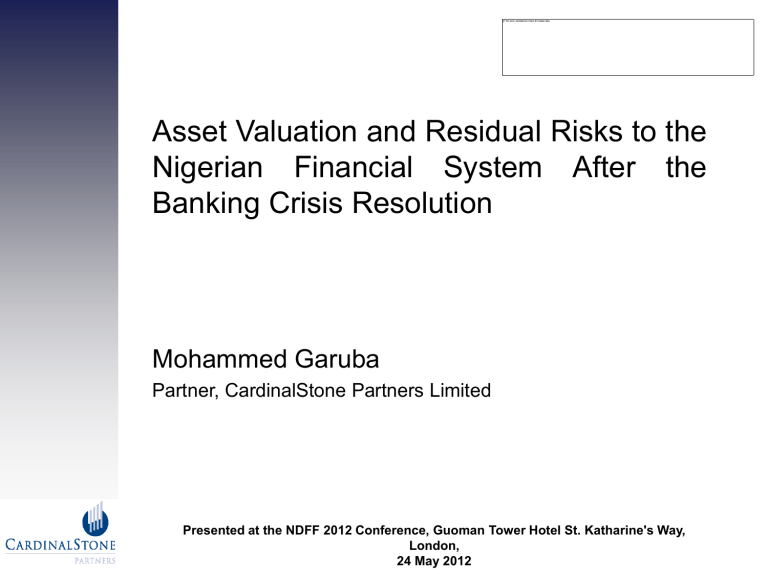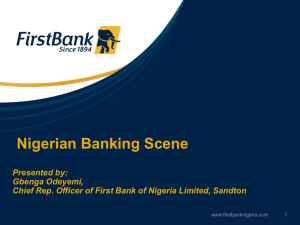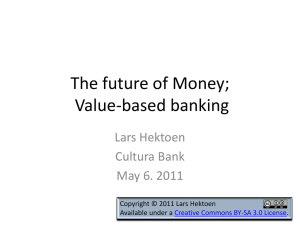Asset Valuation and Residual Risks to the Nigerian Financial

Asset Valuation and Residual Risks to the
Nigerian Financial System After the
Banking Crisis Resolution
Mohammed Garuba
Partner, CardinalStone Partners Limited
Presented at the NDFF 2012 Conference, Guoman Tower Hotel St. Katharine's Way,
London,
24 May 2012
Introduction
Economic Overview
Key Highlights
The Nigerian economy is the 30 th largest economy in the world and the 2 nd largest in Sub-Sahara Africa with GDP of US$413 billion in 2011, only after South Africa with
GDP of US$555 billion in the same year. Agriculture accounts for about 40% of Nigeria’s GDP, though crude oil is the country’s major foreign exchange earner
Crude oil output has been on the increase since 2009 due to reduced militants’ activities in the Niger Delta region
- Nigeria is the largest oil producer in Africa, with average crude oil production output of 2.525 mbpd in 2011
(2008: 2.165 mbpd)
With a population of about 167 million people, about 61.5 million (2011 est.) constitutes the country’s labor force
It is expected that the reforms currently undertaken by the
Jonathan administration will be completed by 2015
Key reforms in the economy include:
- Privatization of the power generation and distribution companies to solve the lingering power problems currently faced by the country
- Deregulation of the downstream petroleum industry to free up more funds for infrastructural and social development
Source: World Bank Economic Indicator 3
What lead to asset valuation bubble
Increase in the minimum capital for banking license from N2 billion to N25 billion announced in July
2004 which was effective December 2005 lead to industry consolidation resulting in the decrease of banks from 89 to 25
Nigerian banks raised about N2.0 trillion between 2004 and 2008
Universal banking and its antecedent risks lead to unmanageable growth and poor corporate governance.
Excess liquidity in the financial system and a rapid increase in credit lead to excessive consumption and bad loans
Due to lack of innovativeness for high return products, banks had limited opportunities to create quality risk assets
Accumulation of huge unsecured risk assets in banks portfolio and high leverage to the stock market and real estate sectors
Huge inflows of foreign portfolio investments into Nigeria and other frontier markets
5
What lead to asset valuation bubble (cont.)
Poor or even non-existent risk management oversight in most Nigerian banks led to the concentration of assets in certain risky areas
The significant exposure of the banks to the capital market via margin loans and direct equity investment threatened banking sector stability, as some banks had their capital fully eroded .
Deplorable internal control processes in banks and lax regulatory oversight influenced poor corporate governance and ethical value system
Liquidity drove the proliferation of financial products which were not well tested or fully understood and this allowed for professionally concealed frauds and high level manipulation of financial activities
Lack of coordination between regulators in the financial market – CBN, NSE and SEC.
Poor regulatory oversight in the capital market lead to price manipulation, over trading and unsupervised capital raising
6
What lead to asset valuation bubble (cont.)
Trend in the Equity Market
All-Share Index Performance in 12 years of Democracy
Source: Nigerian Stock Exchange 7
Intervention & Reforms
The Nigerian Economy
The Central Bank of Nigeria together with the Federal Ministry of Finance in making sure there was stability in the financial system after the burst of the asset bubble set up the Asset Management
Corporation of Nigeria (AMCON).
AMCON was set up for the purpose of efficiently resolving the non-performing assets of Nigerian banks thereby helping to achieve equilibrium pricing across most asset classes.
AMCON as a resolution vehicle absorbed the toxic assets of intervened banks and provided liquidity to facilitate the re-capitalization of the banks.
AMCON adopted a fair and transparent valuation basis for the acquisition of margin loans, nonperforming loans and bad loans which lead to timely execution for each tranche asset acquisition.
8
Intervention & Reforms
AMCON has acquired significant Eligible Bank Assets (EBAs)
DECEMBER 31, 2010
• EBA Value Purchased
N2.46 trillion
• AMCON Purchase
Price – N866.2 billion
APRIL 6, 2011
• EBA Value Purchased
N885.3 billion
• AMCON Purchase
Price – N515.2 billion
DECEMBER 28, 2011
• EBA Value Purchased
N675.2 billion
• AMCON Purchase
Price – N377.8 billion
• All Banking Sector Margin Loans • Non-Margin NPLs acquired
• All NPLs of Intervened Banks from 22 Nigerian DMBs
• Systemically important Loans
• Repricing of acquired EBAs
AMCON purchased total EBAs worth N4.02 trillion at a price of N1.76 trillion
Source: AMCON’s website, April 2012 9
Post AMCON intervention
The Central Bank of Nigeria (“CBN”) will embark on another round of stress test to reduce systemic risk. CBN to embark on further stress testing and this will help achieve more confidence for the general public.
Regulators requesting forbearance of loans of 95 stockbrokers amounting to N91 billion and foreclose on the collateral.
AMCON, in its bid to support the capital market reforms, is in discussions with various service providers with a view towards creating new products such as ETFs, unit trusts, etc. from its AUM
Rapid pace of financial innovations to help stabilize the market.
AMCON will embark on additional NPL purchase over time in line with the CBN mandate of capping banking industry NPLs at 5%.
Source: CardinalStone Research 10
Performance of Nigerian Equities versus regional & global peers
NSEASI/African Markets Overview
NSEASI has lagged African peers in the recovery from the global financial crises despite significant improvement in the profitability of quoted companies. This has resulted cheaper market valuations relative to peers
The Nigerian stock market is not immune to events in the global economy and markets. Recent trends show significant correlation between the NSEASI and global market indices
Less volatile currency (in the last 12 months) relative to peers like the South African rand and the Kenyan Shilling
African Currencies/USD NSEASI/Developed markets
Source: CardinalStone Research 11
Risk Considerations
Inherent risk
An Economic downturn
Foreign Investor risk
Foreign Exchange Risk
Regulatory and accounting changes
Infrastructure risk
Interest Rate Risk
Operational Risk
12
Concluding Remarks
Banking sector reforms adopted in Nigeria in response to the financial crisis have so far yielded positive results as the reforms were carried out without depositors losing their money
All the Nigerian banks have been fully recapitalized and relative stability has been restored to the financial system
It was very good that no bank was allowed to fail
AMCON will be judged by the level of its impact on the economy and its antecedent cost to the economy
Regulators will need to work together to create a balance in the financial market.
Research has shown that periods of high international capital mobility have repeatedly produced international banking crises, especially if there’s inadequate regulation and supervision at the time of deregulation.
The savings and investment culture amongst local investors in Nigeria needs to improve. 13
Thank you for your attention
14







